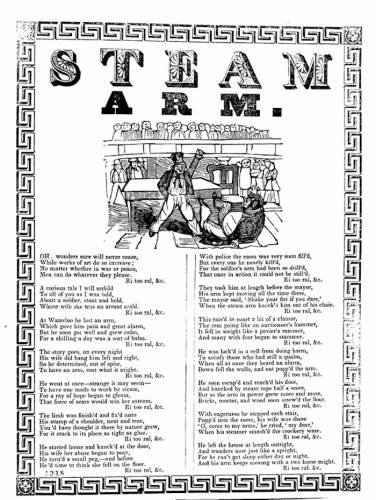
В 18-ом и 19-м веках в Англии, баллады пели на улице, в тавернах или в частных домовых участках – они функционировали как чистое развлечение для масс. Но это было также средством для новостей и для выражения народного чувства. Широкое недовольство, будь то новые технологии или конкретные политические акты парламента, выражались в форме баллады.
В начале 1830-х годов, одним из недовольств, о котором рассказывалось в балладах был эффект паровой энергии, особенно то, как паровоз менял в худшую сторону английскую сельскую местность. Различные баллады выражают это недовольство, но мало какая из них так ярко, как The Steam Arm (Паровая рука).
Приблизительная дата сочинения баллады "Паровая рука" - 1834 или 1835 года. Его автор (ы) остаются неизвестными, но акцент этой баллады на потерянную конечность у солдата может намекнуть, что автором был именно солдат, который потерял руку на войне.
"Паровая рука", возможно, описала и показала первого киборга в популярной фантастике и возможно первая указала на идею замены конечностей, которая стала общей в 20 веке. Что еще более важно, это раннее произведение научной фантастики было сочинено во времена, когда литература ужасов только отделялась от своих готических истоков.
А вот и сам оригинальный текст баллады:
The Steam Arm
Oh! Wonders sure will never cease,
While works of art do so increase;
No matter whether in war or peace,
Men can do whatever they please.
Ri too ral, etc.
A curious tale I will unfold
To all of you, as I was told,
About a soldier stout and bold,
Whose wife, ‘tis said, was an arrant scold.
Ri too ral, etc.
At Waterloo he lost an arm,
Which gave him pain and great alarm;
But he soon got well, and grew quite calm,
For a shilling a day was a sort o' balm.
Ri too ral, etc.
The story goes, on every night
His wife would bang him left and right;
So he determined, out of spite,
To have an arm, cost what it might.
Ri too ral, etc.
He went at once, strange it may seem,
To have one made to work by steam,
For a ray of hope began to gleam,
That force of arms would win her esteem.
Ri too ral, etc.
The limb was finished, and fixed unto
His stump of a soldier neat and true;
You'd have thought it there by nature grew,
For it stuck to its place as tight as glue.
Ri too ral, etc.
He started home and knocked at the door,
His wife her abuse began to pour;
He turn'd a small peg, and before
He'd time to think, she fell on the floor.
Ri too ral, etc.
With policemen soon his room was fill'd,
But every one he nearly killed;
For the soldier's arm had been so drill'd,
That once in action, it couldn't be still'd.
Ri too ral, etc.
They took him, at length, before the mayor,
His arm kept moving all the while there;
The mayor said ‘Shake your first if you dare,'
When the steam arm knocked him out of the chair.
Ri too ral, etc.
This rais'd in court a bit of a clamour,
The arm going like an auctioneer's hammer;
It fell in weight like a paviour's rammer,
And many with fear began to stammer.
Ri too ral, etc.
He was lock'd in a cell for doing harm,
To satisfy those who had still a qualm,
When all at once they hear an alarm,
Down fell the walls and out popp'd the arm.
Ri too ral, etc.
He soon escap'd and reach'd his door,
And knock'd by steam raps half a score;
But as the arm in power grew more and more,
Bricks, mortar and wood soon strew'd the floor.
Ri too ral, etc.
With eagerness he stepp'd each stair,
Popp'd into the room–his wife was there;
‘Oh! Come to my arms', he said, ‘my dear';
When his steamer smash'd the crockery ware.
Ri too ral, etc.
He left his house, at length, outright,
And wanders now just like a sprite;
For he can't get sleep either day or night,
And his arm keeps moving with two-horse might.
Ri too ral, etc.
Перевод: cyberpunkworld.net
По материалам: io9.com
|






